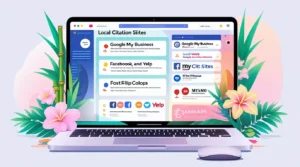Is SEO Worth it for Small Business?
In today’s digital age, having an online presence is crucial for any business, big or small. With the competition getting fiercer by the day, small businesses must find ways to stand out. One such way is through Search Engine Optimization (SEO). But is SEO really worth it for small businesses? In this blog post, we’ll dive deep into this question, explore the benefits and challenges, and help you determine whether investing in SEO for small business is a wise decision.
Jump to
ToggleSEO and Its Importance
What is SEO?
SEO, or Search Engine Optimization, is the process of optimizing a website to rank higher on search engine results pages (SERPs). It involves various techniques, including keyword research, on-page optimization, content creation, and link building, all aimed at increasing a website’s visibility and driving organic traffic.
For small businesses, SEO can be a game-changer. Unlike paid advertising, which requires continuous investment, SEO offers long-term benefits. Once your website ranks well for relevant keywords, it can continue to attract visitors without additional costs. However, SEO is not a one-time effort; it requires ongoing work and adaptation to changing algorithms and market trends.
The Role of SEO in Business Growth
For small businesses, every customer counts. SEO can help small businesses reach their target audience more effectively by appearing in search results when potential customers are looking for products or services they offer. This targeted exposure can significantly boost brand awareness and lead to increased sales.
Moreover, SEO helps build credibility. Websites that appear on the first page of search results are often perceived as more trustworthy and reliable. For a small business, establishing trust with potential customers can make a significant difference in conversion rates.
The Benefits of SEO for Small Business
1. Increased Visibility and Brand Awareness
One of the primary benefits of SEO for small businesses is increased visibility. When your website ranks high on search engines, more people will see it. This increased exposure can lead to more clicks, more traffic, and ultimately more customers.
SEO also enhances brand awareness. Even if users don’t click on your website immediately, seeing your brand name repeatedly in search results can create a sense of familiarity. Over time, this can lead to increased trust and a higher likelihood of conversion.
2. Cost-Effective Marketing
Unlike traditional advertising, which can be expensive and often yields temporary results, SEO is a cost-effective marketing strategy. While there are costs associated with hiring SEO experts or investing in SEO tools, the long-term benefits outweigh the initial investment.
For small businesses with limited marketing budgets, SEO provides an opportunity to compete with larger companies. By focusing on local SEO or niche keywords, small businesses can attract highly targeted traffic without breaking the bank.
3. Higher Conversion Rates
SEO helps attract visitors who are actively searching for products or services like yours, making them more likely to convert into customers. When a user searches for a product and finds your website at the top of the results, they are more likely to trust your business and make a purchase.
Additionally, SEO also involves optimizing your website’s user experience, which can lead to higher conversion rates. A well-structured, fast-loading, and mobile-friendly website can significantly improve the user experience, making it easier for visitors to find what they’re looking for and complete a purchase.
The Challenges of SEO for Small Business
4. Time and Resource Investment
While SEO offers many benefits, it’s important to acknowledge the challenges, especially for small businesses. One of the biggest challenges is the time and resource investment required. SEO is not a quick fix; it takes time to see results. Depending on the competitiveness of your industry and the current state of your website, it can take several months to start seeing significant improvements in rankings and traffic.
For small businesses with limited resources, this can be a hurdle. Managing day-to-day operations while also focusing on SEO can be overwhelming. However, the long-term benefits often justify the investment, especially if you can allocate resources effectively or partner with an experienced SEO agency.
5. Constantly Changing Algorithms
Search engines like Google are constantly updating their algorithms to provide users with the best possible results. While this is great for users, it can be challenging for businesses trying to maintain or improve their rankings.
For small businesses, staying up-to-date with these changes can be difficult. A strategy that worked well a few months ago might become less effective or even detrimental after an algorithm update. This requires small businesses to be agile and continuously adapt their SEO strategies to remain competitive.
How to Maximize the Benefits of SEO for Small Business
6. Focus on Local SEO
For many small businesses, local SEO can be particularly effective. Local SEO involves optimizing your website and online presence to attract local customers. This is especially important for businesses with a physical location or those that serve a specific geographic area.
By optimizing your Google My Business listing, getting positive reviews, and using location-specific keywords, you can increase your chances of appearing in local search results. This can drive foot traffic to your store or increase inquiries from local customers, leading to more sales.
7. Create High-Quality Content
Content is the cornerstone of SEO. Creating high-quality, relevant content that addresses your target audience’s needs is essential for SEO success. For small businesses, this means focusing on content that provides value to potential customers, such as how-to guides, product comparisons, and industry insights.
By consistently producing high-quality content, you can establish your business as an authority in your industry. This not only improves your search rankings but also builds trust with your audience, making them more likely to choose your business over competitors.
8. Build a Strong Backlink Profile
Backlinks, or links from other websites to your site, are a key factor in SEO. Search engines view backlinks as a sign of credibility and authority. The more high-quality backlinks you have, the better your chances of ranking higher in search results.
For small businesses, building a strong backlink profile can be challenging but not impossible. Start by reaching out to local businesses, industry blogs, and online directories to see if they will link to your website. You can also create shareable content, such as infographics or videos, that others in your industry will want to link to.
Is SEO Worth the Investment for Small Businesses?
9. Long-Term Growth and Sustainability
One of the most compelling reasons to invest in SEO for small business is its potential for long-term growth and sustainability. Unlike paid advertising, which stops driving traffic as soon as you stop paying for it, SEO continues to bring in organic traffic long after the initial investment.
This long-term approach is particularly valuable for small businesses looking to build a sustainable online presence. While it may take time to see significant results, the ongoing benefits of a well-executed SEO strategy can far outweigh the initial costs.
10. Competing with Larger Businesses
Small businesses often face stiff competition from larger companies with bigger marketing budgets. However, SEO levels the playing field by allowing small businesses to compete for the same search terms as larger companies.
With a well-targeted SEO strategy, small businesses can rank higher in search results for specific, niche keywords that are less competitive. This can drive highly targeted traffic to your site, giving you an edge over larger competitors who may not be focusing on those specific terms.
11. Measuring Success and ROI
One of the advantages of SEO is its measurability. Unlike traditional forms of advertising, where it can be difficult to track the exact return on investment, SEO allows you to track your progress and measure success. Tools like Google Analytics and Google Search Console provide valuable insights into your website’s performance, including traffic, rankings, and conversions.
For small businesses, this data is crucial in determining whether your SEO efforts are paying off. By regularly reviewing and analyzing this data, you can make informed decisions about where to focus your efforts and how to improve your strategy.
Conclusion: Is SEO Worth It for Small Business?
In conclusion, SEO for small business is not just worth it; it’s essential. While it requires time, effort, and resources, the long-term benefits of increased visibility, higher conversion rates, and sustained growth make it a valuable investment. By focusing on local SEO, creating high-quality content, and building a strong backlink profile, small businesses can compete with larger companies and build a successful online presence.
If you’re a small business owner wondering whether to invest in SEO, the answer is clear: SEO is worth it. It’s a cost-effective way to attract targeted traffic, build credibility, and achieve long-term growth. However, it’s important to approach SEO with a well-thought-out strategy and the understanding that results won’t happen overnight.
Are you ready to take your small business to the next level with SEO? Or do you have any questions about implementing SEO strategies? Leave a comment below, and let’s discuss how SEO can benefit your business!






